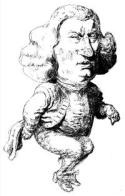Samuel Johnson, Selected Essays, ed. David Womersley (Penguin Classics, 2003). RRP A$19.95
Scholars and book collectors have always had some sort of access to Samuel Johnson’s essays, but this is the first popular edition of his most characteristic mode of writing since 1957, when a volume of selections from The Rambler was published in the famous Everyman’s Library. For a newcomer wanting to read the best of Johnson, this book is a must.
It was as an essayist that Johnson first attracted public notice – shortly before the Dictionary was published he was awarded an honorary Oxford M.A., chiefly on the basis (so the citation said) of the stylistic and moral excellence of The Rambler essays. Such writing is unlikely to gain a reputation for a writer today, but in the eighteenth century there was a ready readership for writing which offered wit and good sense, in more-or-less artful and entertaining terms. Even today there is far more of such broadly “critical” literature around than we might at first imagine, but it takes the form of columns in newspapers, book reviews, and other such commentary occupying the margin between literature and daily life.
The Rambler was Johnson’s own project, initiated while he was preparing the Dictionary, to provide extra income – but also to give him an avenue for a different kind of literary activity. He wrote 1200-1600 words for it twice a week for two years, 1750-52. Some of the essays are tales and fictional portraits, usually with a satirical edge, many others purport to be letters from fictitious correspondents, and another important component is literary criticism. The editor of this selection, David Womersley, makes an effort to give a taste of all this range of material.
A year after Johnson concluded The Rambler, he contributed similar essays to The Adventurer, which was a collaborative project, managed by his friend John Hawkesworth. Then in 1758 he wrote a series of 104 shorter, lighter essays under the name “The Idler,” which were published as leading articles in a weekly newspaper.
There is a myth that in Boswell’s Life of him, Johnson is witty, but in his own writing Johnson is dull. Certainly, his prose demands attention, but it is richly rewarding. Each sentence is an argument. Furthermore, there is – at least, as I read it – a wry humour that constantly bubbles under the self-consciously dignified prose. For an instance, this, taken from Rambler 106:
It is, indeed, the fate of controvertists, even when they contend for philosophical or theological truth, to be soon laid aside and slighted. Either the question is decided, and there is no more doubt or opposition; or mankind despair of understanding it, and grow weary of disturbance, content themselves with quiet ignorance, and refused to be harassed with labours which they have no hopes of recompensing with knowledge.
Here, as in so many places, he playfully undervalues the persuasive power of literature, and implicitly challenges his readers to rise above “quiet ignorance.”
And there is everywhere detectable a pleasure in simply using language. This display of imagery and alliteration is from the shorter, livelier Idler (No. 58):
Pleasure is very seldom found where it is sought. Our brightest blazes of gladness are commonly kindled by unexpected sparks. The flowers which scatter their odours from time to time in the paths of life, grow up without culture from seeds scattered by chance.
Womersley’s is a generous selection. It is not an anthology of witticisms, but gives each essay in its entirety; it includes 76 of the 208 Ramblers, 34 of the 104 “Idlers”, and 16 of Johnson’s 29 contributions to The Adventurer. In addition, there are six miscellaneous essays published for a range of occasions. The whole amounts to a chunky volume of almost 600 pages. He provides useful notes.
I regret that, like all previous editors, he neglects to translate for non-classically educated readers the classical names that Johnson bestows on many of his characters. Also, whilst I can understand him omitting from the Contents pages the “titles” of individual essays provided in the earliest collected editions, as they give a false sense of topical orientation to the essays, they could have been included as an appendix, for the use of re-readers.
Also, his selection under-represents those more lively Ramblers which include fictional or narrative components.
Johnson is now very well represented in the popular Penguin list, with editions of Rasselas, the Collected Poems (edited by David Fleeman), his Journey to the Western Islands, Johnson on Shakespeare, a Selected Writings, and a highly truncated edition of Boswell’s Life – though not all of these are in print.
Recently I was reading the newly-published Collected Letters of C. S. Lewis, in which Lewis mentions having for a period read a Rambler a night before bed. He writes, “I find Johnson very bracing” in his “brave, sensible dignity.” Indeed, there are few better prescriptions for wisdom, or for style and wit, than a dose of prose from the great Doctor.

